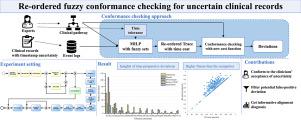Journal of Biomedical informatics ( IF 4.0 ) Pub Date : 2023-12-07 , DOI: 10.1016/j.jbi.2023.104566 Sicui Zhang 1 , Laura Genga 2 , Lukas Dekker 3 , Hongchao Nie 4 , Xudong Lu 5 , Huilong Duan 5 , Uzay Kaymak 6

|
Modern hospitals implement clinical pathways to standardize patients’ treatments. Conformance checking techniques provide an automated tool to assess whether the actual executions of clinical processes comply with the corresponding clinical pathways. However, clinical processes are typically characterized by a high degree of uncertainty, both in their execution and recording. This paper focuses on uncertainty related to logging clinical processes. The logging of the activities executed during a clinical process in the hospital information system is often performed manually by the involved actors (e.g., the nurses). However, such logging can occur at a different time than the actual execution time, which hampers the reliability of the diagnostics provided by conformance checking techniques. To address this issue, we propose a novel conformance checking algorithm that leverages principles of fuzzy set theory to incorporate experts’ knowledge when generating conformance diagnostics. We exploit this knowledge to define a fuzzy tolerance in a time window, which is then used to assess the magnitude of timestamp violations of the recorded activities when evaluating the overall process execution compliance. Experiments conducted on a real-life case study in a Dutch hospital show that the proposed method obtains more accurate diagnostics than the state-of-the-art approaches. We also consider how our diagnostics can be used to stimulate discussion with domain experts on possible strategies to mitigate logging uncertainty in the clinical practice.
中文翻译:

对不确定的临床记录重新排序模糊一致性检查
现代医院实施临床路径来规范患者的治疗。一致性检查技术提供了一种自动化工具来评估临床流程的实际执行是否符合相应的临床路径。然而,临床过程的典型特征是在执行和记录方面都具有高度的不确定性。本文重点关注与记录临床过程相关的不确定性。在医院信息系统中的临床过程期间执行的活动的记录通常由所涉及的参与者(例如,护士)手动执行。然而,这种记录可能发生在与实际执行时间不同的时间,这妨碍了一致性检查技术提供的诊断的可靠性。为了解决这个问题,我们提出了一种新颖的一致性检查算法,该算法利用模糊集理论的原理在生成一致性诊断时结合专家的知识。我们利用这些知识来定义时间窗口中的模糊容差,然后在评估整个流程执行合规性时,使用该知识来评估记录活动的时间戳违规程度。在荷兰一家医院的现实案例研究中进行的实验表明,所提出的方法比最先进的方法获得了更准确的诊断。我们还考虑如何使用我们的诊断来激发与领域专家就可能的策略进行讨论,以减轻临床实践中记录的不确定性。











































 京公网安备 11010802027423号
京公网安备 11010802027423号